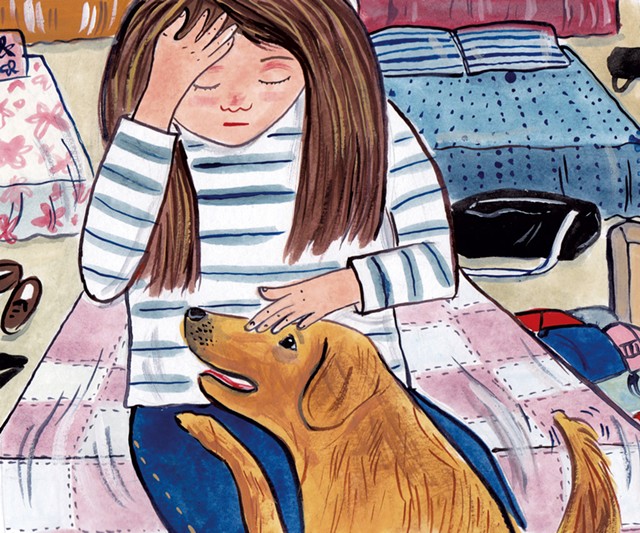click to enlarge 
More pets than people are living this week at the Clarina Howard Nichols Center in Lamoille County, which provides a home for women and children fleeing domestic or sexual violence. At staff meetings, a pug on the premises hops into people's laps.
"It brings a totally different vibe to the house," said Ally Scanlon, family and youth advocacy specialist. No children are at the shelter right now, but when kids stay there, they play with the animals all the time, she said.
Clarina is one of nine shelters in Vermont for people who have experienced domestic violence, and the only one where residents can stay with their cats and dogs, according to Karen Tronsgard-Scott, executive director of the Vermont Network Against Domestic and Sexual Violence.
The shelter is currently providing temporary housing to four people, four cats and two dogs, Scanlon said. In the past fiscal year, 10 of the 27 people who stayed there brought their pets, she noted.
The center established its Sheltering Animals and Families Together (SAF-T) program three years ago, using grant money to build kennels, fence in the yard, and purchase the equipment and food needed for animal care. The grant was provided by an organization called RedRover, which is working to create at least one pet-friendly shelter per state, according to its website.
At Clarina, staffers were interested in the program because they recognized that pet ownership can make it more difficult for a person to leave an abusive situation, Scanlon said. "We jumped on it because we thought, Wouldn't it be great if we could have pets here?"
Pets are a "paramount consideration" to a person who is thinking about getting out of a violent home, Tronsgard-Scott said. Many people won't leave without them.
"People who are experiencing domestic violence are just like you and I, and they have abusive partners," Tronsgard-Scott told Seven Days. "They love their pets. I'm sitting here with my two dogs, and they're like children to us."
Studies indicate that a person who is violent toward an animal is more likely to cause serious or lethal injury to a nonviolent partner, she said. So pets can be both an indicator of possible violence and a source of "loving comfort" to someone experiencing domestic violence, in Tronsgard-Scott's view.
A primary concern for residents with pets is that their animals might be harmed if left behind, according to Scanlon. The animals provide support and comfort to their owners — and to others, she said. Guests who don't have pets are "uplifted" by the critters' presence.
"I feel like it brings them a little bit more joy," Scanlon said. "Guests who don't have pets will become best friends of people who do and will help them take care of the animals."
In the six years Scanlon has worked at the center, she has seen people return for multiple stays. Women who got pets between stays at Clarina have reported that they remained out of an abusive relationship for a longer interval after they had a pet, according to Scanlon.
"Pet owners know how attuned pets are to what's going on in our lives," Tronsgard-Scott said. "They're really attuned to their owners' trauma. Pets are a loving comfort to people who experience domestic violence, just as they are to you and me."
An online list of SAF-T facilities indicates that Clarina is the only shelter in New England that accepts people with their pets. Staff at Clarina say they receive inquiries from women outside Vermont seeking a place to stay. "They are specifically trying to come to our shelter because they heard that we allow pets," Scanlon said.
A more common practice is for shelters to work with animal rescue organizations to arrange foster care for pets, according to Tronsgard-Scott. She knows of no plans for another animal-friendly shelter in Vermont.
Two residents at the shelter wrote for Seven Days about the experience of having their dogs with them under the SAF-T program. For their protection, we have not revealed their identities.
Guest No. 1 (44 years old)
There was such a fast upheaval of mine and my dog's life that being able to stay together was an immense positive emotional help for both of us during a time of great pain and turmoil. Trauma does not take time off. Having 24/7 companionship and comfort with you makes a world of difference for the better.
When dealing with trauma, having a pet by your side brings immense comfort and strength during a time of great pain and struggle. I think you could make SAF-T better by spreading the program to other shelters as far and wide and quickly as possible. It would help bring some much-needed relief from pain for adults, kids and pets alike. From someone and their pet who are very grateful that the program exists, sending out a thank-you to the Clarina Howard Nichols Center for taking a chance on the program. From mine and my dog's point of view, it is well worth it.
Guest No. 2 (49 years old)
My dog literally saved my life. I adopted him from a shelter in 2016. I am disabled with a chronic condition, PTSD and major anxiety disorder. If I did not have him with me I would be lost ... He gives me a reason to get out of bed every morning — he needs to be walked, fed and bathed, almost like having a child, a "furry" one at that! I was very scared to leave my abuser, but [my dog] gave me the strength and courage to finally leave a very "toxic" situation.
When my time comes to leave [the] shelter, it will be very scary — I have never truly been by myself, so it will be a new "adventure" to journey on together. I was fortunate to find a shelter that was "dog friendly" — had it not been for the staff and shelter, we would be sleeping/living in my car. In a perfect world, there would be no domestic/sexual assaults — but until then, I have been blessed to have my furry companion/therapy dog to help me through what I would otherwise be going through alone. Maybe someday other shelters will follow their example and allow pets in shelters across the country!



















































